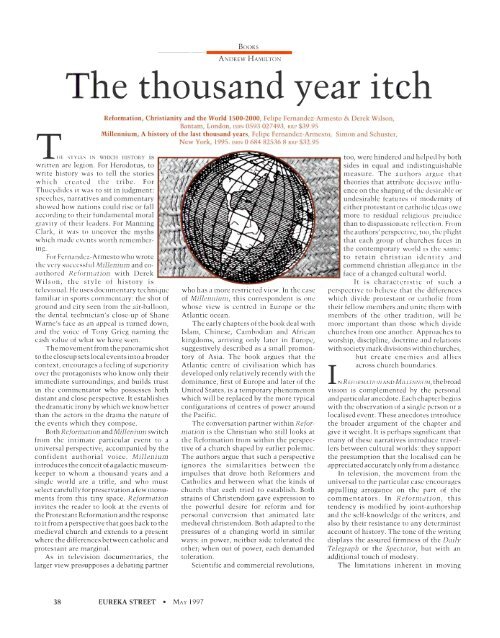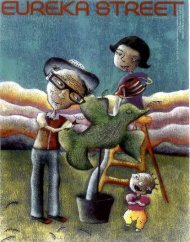BooKsA NDREW H AMIL TONThe thousand year itchReformation, Christianity and the World 1500-2000, Felipe Fernandez-Annesto & Derek Wilson,Bantam, London, ISBN 0593 027493, RRP $39.95Millennium, A history of the last thousand years, Felipe Fernandez-Armesto, Simon and Schuster,New York, 1995. ISBN 0 684 82536 8 RRP $32.95T HE STYLES IN WHIC H HISTORY is tOO, were hindered and helped by bothwritten are legion. For Herodotus, tosides in equal and indistinguishablewrite history was to tell the storiesm easure. The authors argue thatwhich created t h e tribe. For theories that attribute decisive influ-Thucydides it was to sit in judgment:ence on the shaping of the desirable orspeeches, narratives and commentaryundesirable features of modernity ofshowed how nations could rise or falleither protestant or catholic ideas oweaccording to their fundamental m oralmore to residual religious prejudicegravity of their leaders. For Manningthan to dispassionate reflection. FromClark, it was to uncover the mythsthe authors' perspective, too, the plightwhich m ade events worth remember-that each group of churches faces ining.the contemporary world is the same:ForFernandez-Armestowhowroteto re tain christian identity andthe very successful Milleniwn and co-commend christian allegiance in theauthored Reformation with Derekface of a changed cultural world.Wilson, t h e style of h ist ory isIt is charac teristic of such atelevisual. He uses documentary technique who has a more restricted view. In the case perspective to believe that the differencesfamiliar in sports commentary: the shot of of Millennium, this correspondent is one which divide protestant or catholic fromground and city seen from the air-balloon, whose view is centred in Europe or the their fellow members and unite them withthe dental technician's close-up of Shane Atlantic ocean .Warne's face as an appeal is turned down, The early chapters of the book deal withand the voice of Tony Grieg naming the Islam, Chinese, Cambodian and Africancash value of what we have seen.kingdoms, arriving only later in Europe,Themovementfromthepanoramicshot suggestively described as a small promontothe closeup sets local events into a broader tory of Asia. The book argues that thecontext, encourages a feeling of superiority Atlantic centre of civilisation which hasover the protagonists who know only their developed only relatively recently with theimmediate surroundings, and builds trust dominance, first of Europe and later of thein the commentator w ho possesses both United States, is a temporary phenomenondistant and close perspective. It establishes which will be replaced by the more typicalthe dramaticironyby whichweknowbetter configurations of centres of power aroundthan the actors in the drama the nature of the Pacific.the events which they compose.The conversation partner within Reformationis the Christian who still looks atBoth Reformation andMillenium switchfrom the intimate particular event to a the Reformation from within the perspectiveof a church shaped by earlier polemic.universal perspective, accompanied by theconfident authorial voice. Millenium The authors argue that such a perspectiveintroduces the conceit of a galactic museumkeeperto whom a thousand years and a impulses that drove both Reformers andignores the similarities between thesingle world are a trifle, and who must Catholics and between what the kinds ofselect carefully for preservation a few m onuments from this tiny space. Reformation strains of Christendom gave expression tochurch that each tried to establish. Bothinvites the reader to look at the events of the powerful desire for reform and forthe Protestant Reformation and the response personal conversion that animated lateto it from a perspective that goes back to the medieval christendom. Both adapted to themedieval church and extends to a present pressures of a changing world in similarwhere the differences between catholic and ways: in power, neither side tolerated theprotestant are marginal.other; when out of power, each dem andedAs in television documentaries, the toleration.larger view presupposes a debating partner Scientific and commercial revolutions,m embers of the other tradition, will bemore important than those which dividechurches from one another. Approaches toworship, discipline, doctrine and relationswith society mark divisions within churches,but create en emies and alliesIacross church boundaries.N R EFORMATION AND M ILLENNIUM, the broadvision is complemented by the personaland particular anecdote. Each chapter beginswith the observation of a single person or alocalised event. These anecdotes introducethe broader argument of the chapter andgive it weight. It is perhaps significant thatmany of these narratives introduce travellersbetween cultural worlds: they supportthe presumption that the localised can beappreciated accurately only from a distance.In television, the movem ent from theuniversal to the particular case encouragesappalling arrogan ce on the part of thecommentators. In R eformation, thistendency is modified by joint-authorshipand the self-knowledge of the writers, andalso by their resistance to any deterministaccount of history. The tone of the writingdisplays the assured firmness of the DailyTelegraph or the Specta tor, but with anadditional touch of modesty.The limitations inherent in m oving38 EUREKA STREET • MAY 1997
easily from the broad to the narrowperspective, however, become evident inthe authors' prejudices. Telling anecdotesare found to illustrate the dangers of downmarketworship or of compromise with thesecular, and they seem to make a conclusivecase. But anecdotes can equally be found toillustrate the disadvantages of formalistliturgy and a clerical construction ofreligious identity. In assessing work of thiskind, then, the reader trusts the good senseof the authors' general historical judgmentand not the epiphanic value of the particularexample.The large question, however, which thismethod raises is whether it can do justice tothe Reformation and to the churches thathave come out of the Reformation tradition.Those involved on both sides of theReformation conflict were passionately involvedin issu es that have shaped the lifeand faith of their successors. T o adopt abroader perspective, then, could be seen asrem oving oneself from the tradition ofwhich one is part.The point can be illustrated by a literaryconceit in the Spiritual Exercises of IgnatiusLoyola, devised in the early 16th century. Itinvolves a movement from large to smallfocus typical of television technique.Ignatius begins with the broadest viewhe can imagine: the persons of the HolyTrinity look down on the whole earth, seeinghuman beings sinning and going to hell,and decide to rescue them. The focus isthen narrowed: to Galilee, to Nazareth, andto a small house and finally to a small roomwithin where the angel speaks with Mary.The m editation is designee\ to lead thosewho pray it to feel and respond out ofgra titude to Jesus Christ.Ignatius is convinced that both the largeand the small picture matter. The scenewith Mary and the angel is not only anexample of the larger truth of God's care,but expresses it and even makes itseffectiveness hang in the balance. In themeditation, too, the viewer of the scene isalso a participant, whose respon se of recognitionand involvement also matter. Ascommentator, Ignatius is concerned not togive information but to allow response.This movement was characteristic ofboth sides of the Reformation. It involvedthe appropriation of a large story, itsembodiment in the smaller human storie ,and a personal response leading to commitment.The link between large story, individualcase and the reader's response ensuredthat there is no space for dramatic irony.The characteristic Reformation stylewas weakened, however, by subsequentintellectual habits and traditions. Even inIsaac Watts' great hymn, When I survey thewondrous era s, influenced as it was by theimagery of N ewtonian physics, the focushas switched to the larger picture and theresponse is of a more contemplative kind.The world is conceived on a cosmic scale asthe realm of nature or the orb. A faithfulresponse is necessarily contemplative.The flowering of the detached intellectualstyle can be found in Paley's style ofapologetic, parodied in Dostoyevsky'sBrothers Karamazov. By now the largeperspective can obliterate embarrassingaspects of the smaller picture. Seen from farenough away, this is the best of all possibleworlds, against which the individual storyof injustice or suffering does not count or isa beneficial part. The proper human responseis to recognise the justice and propriety of itall and appreciate the ideological commentaryupon it. Its secular form is economicrationalism .This change of intellectual style isreflected in television documentaries andalso perhaps in these two books. The way inwhich the small picture is seen in relationshipto the large, and the proper response ofthe reader or viewer, are points at issue, andBooKs: 2M AX T EICHMANNmake the large scale treatment of theReformation problematic for those whosetradition includes it.If this is a problem, it will be felt onlyby those who live consciously on eitherside of the Reformation tradition . For them,there will be two ways of handling it. Thefirst is the ecclesiastical way: to identifythe large story of God's love with thechurch or with reformation doctrine andto identify the correct response as one ofacceptance of the reformation principle orthe church in all its structures. In this casethe smaller picture of human experienceand the ways in which it has changedculturally will be unimportant and evenideologically suspect.The second way is to return to somethinglikethe Ignatian image: a large pictureof God's love, total commitment to thesmall picture of human dignity, and aresponse that takes the large and smallpictures seriously within a modest church.Those who take this latter view willfind much to stimulate them in Reformationand Millennium.•Andrew Hamilton SJ teaches early churchhistory at the United Faculty of Theology,Melbourne.Jigsawing the worldThe Clash of Civilisations and the Remaking of World Order,Samuel P. Huntington,Sim on and Schuster, 1996. ISBN 0 684 811642 RRP $39 .95Amass of undifferentiated and, in many cases,DES I RE TO CREATE ORDER out of a finally, one hopes, predicting the outcomesof these interactions, and describing whatapparently conflicting elem ents, such as the most likely shape, composition andsocial forces, institutional aggregations, condition the overall system will be in, say,value system s, is a recurring aspiration for 50 years hence.man.Sam Huntington has just given us a newWe don' t like ch aos, unexplained political model of the world with which tochanges, rogue e l ephants. W e like play, and has provided much subsidiarypredictability, crave explanations, and the material on particular issues, at least asconversion of the unfamiliar to the familiar. illuminating as the unpacking of his mainIn international politics, one way of them es. These include immigration (pp 198-doing this is to construct a model of the 206); human rights and democracy (pp192-global system, (which is changing as you 8) and faultline wars (chapters 10 and 11 ).go ); identifying what we think are its core Other systemic analyses haveelements, and examining them in some concentrated upon the states system, withdetail, then charting the often volatile nation states as the main actors. Orinteractions between these elements. And economic/technological forces as theV OLUME 7 NUMBER 4 • EUREKA STREET 39
















